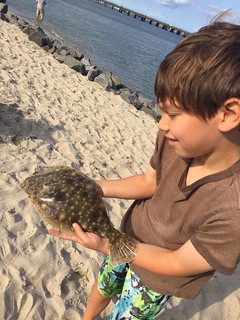Weekly Fishing Report: September 13
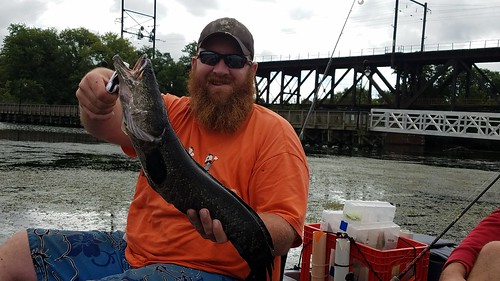
Vince Roberts holds up a northern snakehead he caught in the lower Susquehanna recently. Photo by Josh Cofiell
After being away for two weeks, I’m struck by the changes that are occurring as we drift out of the grasp of summer. We all need to thank Erik Zlokovitz for doing such a great job covering the fishing report and keeping you informed of our fishing opportunities in Maryland while I was away.
Before we get into this week’s fishing report, I wanted to remind everyone that they can submit their own fishing reports and photos to the Maryland Angler’s Log. To post a report, please email your name, hometown, photos, location information and additional content for your report. All information is optional, but encouraged. New reports are posted daily during the busy fishing seasons. You can see our most recent Angler’s Log here.
Recent cooler weather patterns have brought a very welcomed shift in striped bass fishing patterns in the Chesapeake Bay. Water temperatures have dipped to the low 70s in many areas and rockfish are roaming more freely. Live lining spot at channel edges at Love, Swan and Podickory points continues to be a productive draw but striped bass are holding to bottom structure in other areas and jigging is becoming increasingly productive. Various shoal areas in the bay and the mouths of some of the major tidal rivers are holding suspended fish.
Live lining spot continues to be very popular since bait is readily available at shallower locations including Sandy Point and the Magothy River. Channel edges at the major points in about 35 feet of water have been producing the best grade of striped bass. Bluefish are present and they tend to chop off parts of the live spot, so bring plenty of bait. When things get rough, using cut spot offers an alternative for targeting the bluefish and you come up with some tasty fillets for the grill or smoker.
At the very top of the bay in the lower Susquehanna River region, the Conowingo Dam has been producing highly variable water release conditions. Conditions can be extremely low for a day or more until a water release occurs. A few striped bass are being caught at the dam pool and the river with the bonus of some large smallmouth bass. Channel catfish are very common and recently northern snakeheads are becoming part of the mix. In the photo above, Vince Roberts holds up a northern snakehead he caught in the lower Susquehanna.
Breaking fish are encountered sporadically throughout the upper bay region and the usual culprits on the surface are small striped bass and bluefish chasing bay anchovies. At times though larger striped bass can be found lurking deeper underneath the surface action. Jigging with metal or soft plastic jigs can often produce the larger fish.
At the Chesapeake Bay Bridge, its piers continue to be a draw for anyone considering a live lining spot, chunking cut bait or jigging near the bases. Generally, the 25 foot edge on the eastern side of the bridge and the cement abutments and rock piles in the center are the best places to give it a try.
Fishing for white perch continues to be good and in some respects – due to cooler water temperatures – should provide better opportunities in shallower areas. There are perch holding on many of the shoal areas in the bay where they are being caught by bottom fishing. The shallower areas with structure along shorelines can offer fun ultra-light fishing with small spinner jigs and spinners. Channel catfish offer plenty of good fishing in the upper bay and tidal rivers, and offer some fun action.
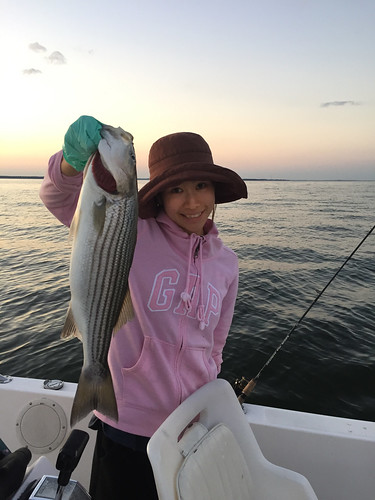
Bing Wilson happily holds up a nice striped bass she caught while casting near breaking fish north of Thomas Point. Photo by Gregory Wilson
Fishing for striped bass in the middle bay region is offering opportunities that did not exist a month ago. Fish are spread throughout much of the region at traditional channel edges and the shallow water fishery is gaining strength. Tolly’s Point, Thomas Point, Eastern Bay and the False Channel have been excellent places to live line spot for striped bass. Spot continue to be readily available in the shallower hard-bottom areas so live lining is a popular way to fish. Bluefish are part of the mix and can be annoying at times but do make good table fare since most are less than 18 inches long. Jigging is coming into its own now that water temperatures are cooler and bait is beginning to form up along steeper channel edges. The best is just around the corner as we get closer to October when bait starts to pour out of the tidal rivers and jigging over schools of striped bass is about as good as anyone could ever expect. Bing Wilson happily holds up a nice striped bass she caught while casting near breaking fish north of Thomas Point.
A mix of bluefish, Spanish mackerel and small striped bass can be found chasing bay anchovies on the surface in many parts of the region. Trolling with small Drone or Clark spoons behind #2 planers around the outside edges has been a good way to catch Spanish mackerel and bluefish. Trolling with surge tube lures (hoses) and bucktails behind inline weights or planers will work well for striped bass and bluefish.
The shallow water striped bass fishery is beginning to show some life in many areas of the tidal rivers and the rocks around Poplar Island. Casting topwater lures in the morning and evening hours offers a fun and exciting way to fish. Many of the striped bass are a bit short of 20 inches but there are enough legal-sized fish to be able to bring dinner home. Along the Dorchester County shoreline in about three to 4 feet of water among stump fields and fallen trees there is the opportunity to find speckled trout that will take topwater lures. There have even been reports of a few red drum within the slot size in the same general area.

Lila Couslin had a fun day fishing with her dad in the Severn River and has a big smile for this white perch she caught. Photo by Eric Couslin
As water temperatures cool fishing for white perch is getting better in the tidal rivers and also out in the bay over hard-bottom areas where a mix of large spot and medium sized croakers are being caught. Bottom rigs baited with a mix of bloodworms, shrimp and peeler crab have been the baits of choice.
The lower bay region offers a wide variety of fishing adventures this week. The opportunities range from bottom fishing to fill empty freezer space to catch and release trophy fishing for large red drum. The lower bay region has it all!
Bottom fishing for large spot and a mix of white perch and croaker continues to be very good in the lower Patuxent and Potomac rivers as well as the Tangier Sound area. The spot are large and fat and make the ingredients for a superb fish fry.
There has been a recent movement of large red drum into the eastern side of the bay near the Target Ship and south past the Middle Grounds; they are being caught by jigging with soft plastics or by trolling with large spoons. These are large red drum in the 40 pound or more category so they must be released since they do not fall within the 18 to 27-inch slot size. Anglers are reminded though that if they take a picture of their red drum next to a tape measure they can apply for a catch and release certificate by entering at one of the many Maryland Fishing Challenge award centers around the state.
There are still some cobia being found near the Target Ship but this fishery is quickly slipping away along with summer. Casting live eels near structure offers the best chances of hooking up with a cobia at this time.
Spanish mackerel tend to be abundant in the lower bay shipping channel and limit catches are common this week. Trolling with small #0 Drone or Clark spoons behind #2 planers has been the best way to target them. Pulling a few lines higher in the water column with inline weights is also a good tactic to round things out.
The shallow water striped bass fishery along the shores of the lower bay region is beginning to come back to life with cooler water temperatures. Casting topwater lures near promising shoreline structure such as the Cedar Point Rocks is always a good bet and unfortunately that particular spot is no secret. There are a lot of undersized fish involved, but plenty of action. Small bluefish will be part of the mix as well.
On the eastern side of the bay speckled trout remain a hot ticket item for those working the marsh edges and small tidal creeks. Casting topwater lures is a great way to fish for them but drifting soft crab chunks or casting Gulp mullet baits are equally deadly tactics for speckled trout.
Before we get into the crabbing and freshwater sections, here is another update on Chesapeake Bay fishing conditions and the forecast from the team at Click Before You Cast.
Weekly Bay Fishing Conditions Forecast Summary (Sept. 13 -20, 2017)
Main bay temperatures are now averaging between 72 and 74 degrees and will continue to cool as we approach the first day of fall (Sept. 22). Expect the stable weather conditions for the next week with only chances of rain through Thursday. While lots of waters will have adequate oxygen from surface to bottom, start your search just above the “Do not fish below this depth.” In the upper bay near Swan Point avoid fishing depths below 16 feet. At the Bay Bridge, fish above 25 feet while from the mouth of the Choptank River south, there is plenty of oxygenated water down well below 30 feet. Expect average water clarity for most of the bay except for some bay spots receiving water from lower eastern shore tributaries. Take advantage of the above average tidal currents starting Saturday through Wednesday as a result of the upcoming new moon Wednesday.
For the full weekly fishing conditions summary and more detailed and up-to-date fishing conditions in your area of the bay, be sure to check out Eyes on the Bay’s Click Before You Cast. Since this is a new feature for Chesapeake Bay anglers, drop us a line with comments or suggestions.
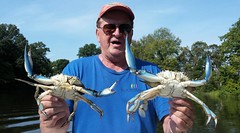
Eldridge Watts got to go crabbing with collapsible traps in the Wye River recently and holds up two heavy jumbos destined for the steamer. Photo by Rich Watts
Recreational crabbing continues to play out what many see as the last hurrah before cooler water temperatures begin to urge crabs to move to deeper water. It will be a better part of a month before that movement really starts to kick into gear. In the meantime crabs are fattening up for the winter and September offers some of the best opportunities for some large heavy crabs. You may not catch a full bushel of these monsters but it will also not take many to satisfy your appetite. The best crabbing continues to be in the lower bay region and especially on the eastern side of the bay. The middle bay region offers good crabbing in most areas and the upper bay is fair to good. Eldridge Watts got to go crabbing with collapsible traps in the Wye River recently and holds up two heavy jumbos destined for the steamer.
A general cooling of water temperatures at Deep Creek Lake and less boat traffic has been making for better fishing opportunities this week. Smallmouth bass and largemouth bass can be found near floating docks and shoreline structure as well as grass bed edges. Topwater lures are a fun way to fish in the morning and evening hours and whacky rigged stick worms, tubes, and crankbaits can also be good choices.
The upper Potomac water temperatures have dropped down to the 70 degree mark this week and floating grass is beginning to be a nuisance as grass beds begin to break up. Smallmouth bass are being caught on tubes and topwater lures fished near current breaks and shaded areas.
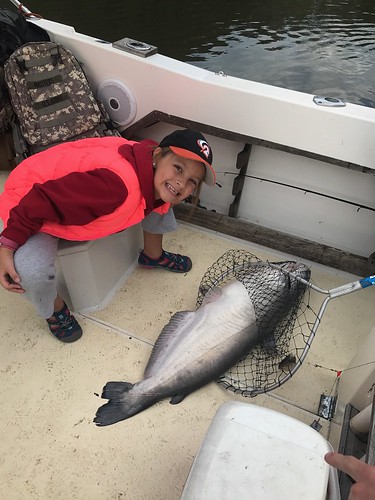
Sadie Lynn Masters managed to land this whopper blue catfish while fishing on the Patuxent River. Photo by Mike Masters
In the tidal Potomac grass beds are breaking up and cooler water temperatures have largemouth bass lurking about in transition areas with structure. Sunken wood, rocks and drop off edges are good place to work tubes, craws and drop shot soft plastics.
In the many impoundments of various sizes throughout the state, fishing for largemouth bass is beginning to show a slight change as fish react to cooling water temperatures and shorter daylight hours. The urge to start putting on some fat for the upcoming cooler months is starting to kick into gear and largemouth bass will be feeding more actively. Lures such as spinnerbaits, topwater lures, crankbaits, stick worms and other soft plastics will all be good choices in various cover and water depth conditions.
Put-and-take trout anglers can start to think about checking out their fishing gear and getting ready for the fall trout stocking program.
Fishing for blue catfish in the tidal portions of the Potomac River, Patuxent River and other rivers such as the Nanticoke on the Eastern Shore are providing plenty of fishing action. Those seeking a slug fest have been fishing for the larger ones along channels with live or fresh cut baits. Those seeking to fill their freezers with good eating fillets have been targeting the smaller catfish with cut baits along channels and slightly shallower areas.
At the Ocean City area surf fishing continues to be focused on kingfish, croaker, spot, flounder and small bluefish. Water temperatures are holding around 71 degrees this week. At the inlet and Route 50 Bridge area a mix of sheepshead and triggerfish are being caught on sand fleas with the occasional small black drum. Croaker are being caught on squid and flounder are being caught as well. Those drifting live spot have been catching some of the larger flounder and a few red drum and striped bass. Alex King takes a last look at a small flounder before releasing it.
Outside the inlet flounder are being caught on some of the near shore shoal areas and out at the wreck and reef sites. The boats headed out for sea bass fishing trips are catching sea bass but also large flounder. Farther offshore at the canyons, there has been a very good wahoo fishery taking place in the Baltimore and Poorman’s canyons. A mix of yellowfin tuna, dolphin as well as white and blue marlin are also being caught in the same general areas.
“There are always greater fish than you have caught, always the lure of greater task and achievement, always the inspiration to seek and endure, to find.” – Zane Grey
 ABOUT THE AUTHOR Keith Lockwood has been writing the Fishing Report since 2003 and has had a long career as a fisheries research biologist since 1973. Over the course of his career he has studied estuarine fishery populations, ocean species, and over a decade long study of bioaccumulation of chemicals in aquatic species in New Jersey. Upon moving to Oxford on the eastern shore of Maryland; research endeavors focused on a variety of catch and release studies as well as other fisheries related research at the Cooperative Oxford Laboratory. Education and outreach to the fishing public has always been an important component to the mission of these studies. Keith is an avid outdoorsman enjoying hunting, fishing, bird dogs, family and life on the eastern shore of Maryland.
ABOUT THE AUTHOR Keith Lockwood has been writing the Fishing Report since 2003 and has had a long career as a fisheries research biologist since 1973. Over the course of his career he has studied estuarine fishery populations, ocean species, and over a decade long study of bioaccumulation of chemicals in aquatic species in New Jersey. Upon moving to Oxford on the eastern shore of Maryland; research endeavors focused on a variety of catch and release studies as well as other fisheries related research at the Cooperative Oxford Laboratory. Education and outreach to the fishing public has always been an important component to the mission of these studies. Keith is an avid outdoorsman enjoying hunting, fishing, bird dogs, family and life on the eastern shore of Maryland.
Want the Weekly Fishing Report sent right to your inbox? Click here to sign up!

